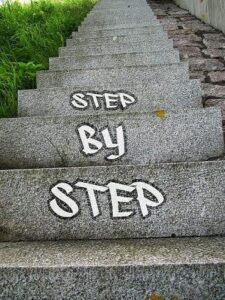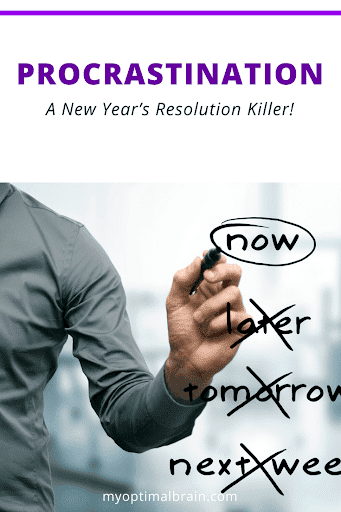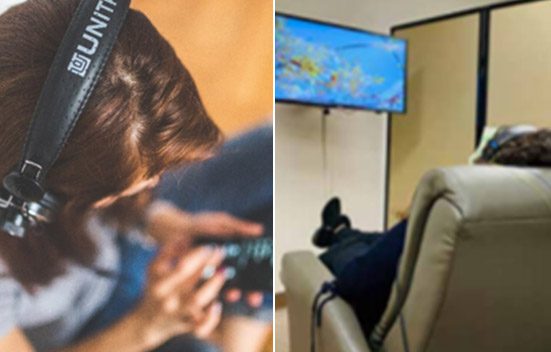The new year has started and with it comes the list of good resolutions. But we all know that sometimes it’s hard to keep up. One of the reasons is our habit of procrastinating. Procrastination has killed many of good resolutions.
Sometimes, I wish I could add “stop procrastinating” on my list of good resolutions. Well, it’s easier said than done! But here is the thing: you can blame it on your brain and more specifically on your unconscious mind.
UNCONSCIOUS MIND EFFECTS
Chris came to us because he needed to do some repairs on his house before selling it. He wanted to buy a bigger one but even if he had the skills to do it and the willingness he had been postponing it for two years now. His wife was not happy with the situation, with three kids sleeping in the same bedroom when they could each have their own. And more importantly, she couldn’t  understand why he was postponing this work. Chris was a successful constructor, doing excellent work “for others” but not for him and his family! He decided to come to us to see if there were some blocks that he was not aware of and what could be done about the situation. With the in-depth evaluations we always do at InnerOptimal before starting any brain training, we found not only severe anxiety but also traumas that were certainly at the origin of Chris’s blocks. During the brain training program, Chris remembered that his father, who had been very abusive with him and his mother before he abandoned them, was always repeating to him “You are not able to make it for yourself. You will never be able to do it, you are a stupid little boy”. Chris had forgotten these statements of his father’s abusive negative talks.
understand why he was postponing this work. Chris was a successful constructor, doing excellent work “for others” but not for him and his family! He decided to come to us to see if there were some blocks that he was not aware of and what could be done about the situation. With the in-depth evaluations we always do at InnerOptimal before starting any brain training, we found not only severe anxiety but also traumas that were certainly at the origin of Chris’s blocks. During the brain training program, Chris remembered that his father, who had been very abusive with him and his mother before he abandoned them, was always repeating to him “You are not able to make it for yourself. You will never be able to do it, you are a stupid little boy”. Chris had forgotten these statements of his father’s abusive negative talks.
We have helped thousands of people with Neurofeedback since 2007 here from Encinitas and we helped before in France. This long experience has proven to us how the subconscious mind influences our acts, and today science confirms it.
Today, with Neurofeedback scientific evaluations and specific brain training sessions, we have witnessed the liberation Neurofeedback specific personalized sessions can bring. These sessions erase the negative impacts of these long-forgotten traumas. In Chris’ case his self-esteem came back, he knew he could do it and he did it!
Neurofeedback sessions can clean up all the emotional impact of recent or old traumas. And you can start anew, free from these life’s imposed limitations. It is what happened to Chris, as with many others in the same situation. Don’t let the past or traumas (conscious or subconscious traumas) hold you back. You deserve a happy, successful life and with us you can make it happen!
LET ME EXPLAIN THE EFFECT OF PROCRASTINATION IN MORE DETAIL
There are a few things we do not like to do, so we delay, hoping that the problem will go away or someone else will take care of it. Unfortunately, this rarely happens. What was a task that you simply did not like, often becomes the thing that you hate the most, because now you must do it under stress and pressure. A deadline is coming up and there are no other excuses to postpone it. Postponing a task can turn into a high stressful situation!
WHEN IT COMES TO PROCRASTINATION, THIS HABIT FEELS HARD TO BREAK
Why do we procrastinate? Why are we so good at procrastinating?
Science shows that it is because of mental blocks or traumas. It is because of a fear of failure, or a fear of getting it wrong due to past trauma. Thus, it prevents us from doing what should be done. The worst is that it is often unconscious yet still works against us. What we call procrastination is actually the “freeze” response of the brain to a stressful situation. The stress generated by a trauma or a fear, even an unconscious fear, will prevent you from doing something. The more you delay the task, the more stressful you become, thus the worse the situation becomes.
If you are following our blogs, you may know by now that when it comes to the brain, we can teach it how to do things differently. This is also true about procrastination.
WHAT CAN YOU DO BY YOURSELF?
To change this habit of procrastinating, you will need to proceed step by step. First of all, you will need to identify the situation and look at what is actually bothering you. You won’t need to understand the trauma, stress, or fear that is causing you to procrastinate. You just need to acknowledge that in a specific situation, you are procrastinating. To overcome it, the easiest way to proceed is to break the task into several small steps. Thus, the brain will process it differently. Instead of seeing this huge task as a threat, the brain now faces small, baby steps that can be done one by one. Then you can take your time to do them and acknowledge each of the small steps. That way, you can keep your stress level under control and your brain learns that you can do it.
BY DOING SO, YOU ARE TEACHING YOUR BRAIN A NEW HABIT. YOUR BRAIN STARTS TO RE-WIRE ITSELF DIFFERENTLY
 So, let’s kick off the year with a few new habits. Not by adding “stop procrastinating” to your resolution list but by being mindful of the situations that force you to procrastinate and taking the process step-by-step, to move forward peacefully and joyfully.
So, let’s kick off the year with a few new habits. Not by adding “stop procrastinating” to your resolution list but by being mindful of the situations that force you to procrastinate and taking the process step-by-step, to move forward peacefully and joyfully.
You can also try our customized advanced neurofeedback training. Training your brain with InnerOptimal is an easy, efficient and long-lasting solution to solve any issues, including procrastination.
We’d love to hear your comments and questions. Feel free to do so.
And, If you like our posts, please share them!
HAPPY NEW YEAR 2025! TOGETHER WE CAN MAKE IT A GREAT YEAR!
With our loving hearts and thoughts to you,
May 2025 be a healthy, prosperous new beginning!
Dr Danielle, Marie-Laure, and their team.





